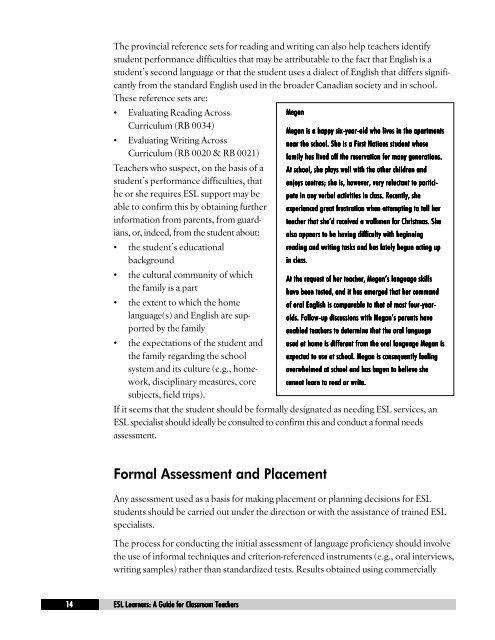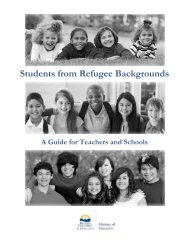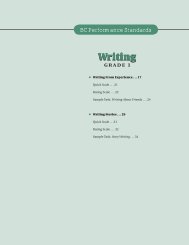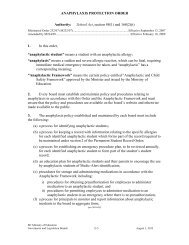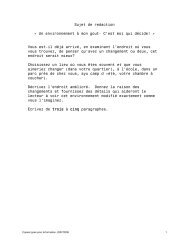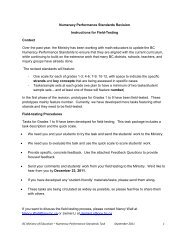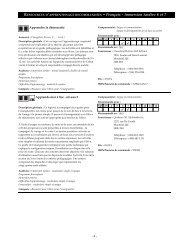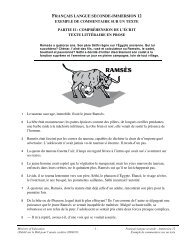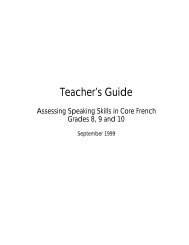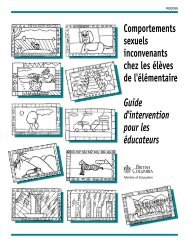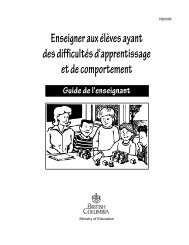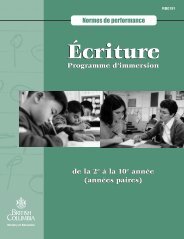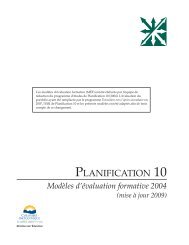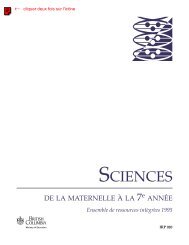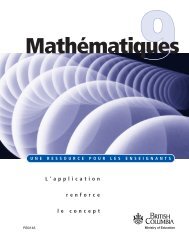A Guide for Classroom Teachers - Education
A Guide for Classroom Teachers - Education
A Guide for Classroom Teachers - Education
You also want an ePaper? Increase the reach of your titles
YUMPU automatically turns print PDFs into web optimized ePapers that Google loves.
14<br />
14<br />
The provincial reference sets <strong>for</strong> reading and writing can also help teachers identify<br />
student per<strong>for</strong>mance difficulties that may be attributable to the fact that English is a<br />
student’s second language or that the student uses a dialect of English that differs significantly<br />
from the standard English used in the broader Canadian society and in school.<br />
These reference sets are:<br />
• Evaluating Reading Across<br />
Megan<br />
Megan<br />
Curriculum (RB 0034)<br />
Megan Megan is is a a happy happy six-year-old six-year-old who who lives lives lives in in the the apartments<br />
apartments<br />
• Evaluating Writing Across<br />
Curriculum (RB 0020 & RB 0021)<br />
near near the the the school. school. She She is is a a First First Nations Nations student student whose<br />
whose<br />
family family has has has lived lived off off the the reservation reservation <strong>for</strong> <strong>for</strong> many many generations.<br />
generations.<br />
<strong>Teachers</strong> who suspect, on the basis of a At At school, school, she she she plays plays well well with with the the the other other children children and<br />
and<br />
student’s per<strong>for</strong>mance difficulties, that enjoysenjoys centres; centres; she she is, is, however, however, very very reluctant reluctant to to participartici-<br />
he or she requires ESL support may be pate pate in in any any verbal verbal activities activities in in class. class. class. Recently, Recently, Recently, she<br />
she<br />
able to confirm this by obtaining further experienced experienced great great frustration frustration when when when attempting attempting attempting to to tell tell her<br />
her<br />
in<strong>for</strong>mation from parents, from guard- teacher teacher that that she’d she’d received received a a walkman walkman walkman <strong>for</strong> <strong>for</strong> Christmas. Christmas. She<br />
She<br />
ians, or, indeed, from the student about: also also appears appears appears to to be be having having difficulty difficulty with with beginning beginning<br />
beginning<br />
• the student’s educational<br />
reading reading and and writing writing tasks tasks and and has has lately lately lately begun begun acting acting up<br />
up<br />
background<br />
in in class.<br />
class.<br />
• the cultural community of which<br />
the family is a part<br />
At At the the request request request of of her her teacher, teacher, Megan’s Megan’s Megan’s language language language skills<br />
skills<br />
have have been been tested, tested, tested, and and it it it has has emerged emerged that that that her her her command<br />
command<br />
• the extent to which the home<br />
ofof oral oral English English is is is comparable comparable to to that that of of most most four-yearfour-year-<br />
language(s) and English are sup-<br />
olds. olds. Follow-up Follow-up Follow-up discussions discussions discussions with with Megan’s Megan’s Megan’s parents parents have have<br />
have<br />
ported by the family<br />
enabled enabled teachers teachers to to determine determine determine that that the the oral oral oral language<br />
language<br />
• the expectations of the student and used used at at home home home is is different different different from from the the oral oral oral language language Megan Megan is<br />
is<br />
the family regarding the school<br />
expected expected to to use use at at school. school. Megan Megan is is consequently consequently feeling<br />
feeling<br />
system and its culture (e.g., home- overwhelmed overwhelmed at at school school and and has has begun begun begun to to believe believe she<br />
she<br />
work, disciplinary measures, core<br />
subjects, field trips).<br />
cannot cannot learn learn learn to to read read or or write.<br />
write.<br />
If it seems that the student should be <strong>for</strong>mally designated as needing ESL services, an<br />
ESL specialist should ideally be consulted to confirm this and conduct a <strong>for</strong>mal needs<br />
assessment.<br />
Formal Assessment and Placement<br />
Any assessment used as a basis <strong>for</strong> making placement or planning decisions <strong>for</strong> ESL<br />
students should be carried out under the direction or with the assistance of trained ESL<br />
specialists.<br />
The process <strong>for</strong> conducting the initial assessment of language proficiency should involve<br />
the use of in<strong>for</strong>mal techniques and criterion-referenced instruments (e.g., oral interviews,<br />
writing samples) rather than standardized tests. Results obtained using commercially<br />
ESL ESL Learners: Learners: A A <strong>Guide</strong> <strong>Guide</strong> <strong>for</strong> <strong>for</strong> <strong>Classroom</strong> <strong>Classroom</strong> <strong>Teachers</strong><br />
<strong>Teachers</strong>


